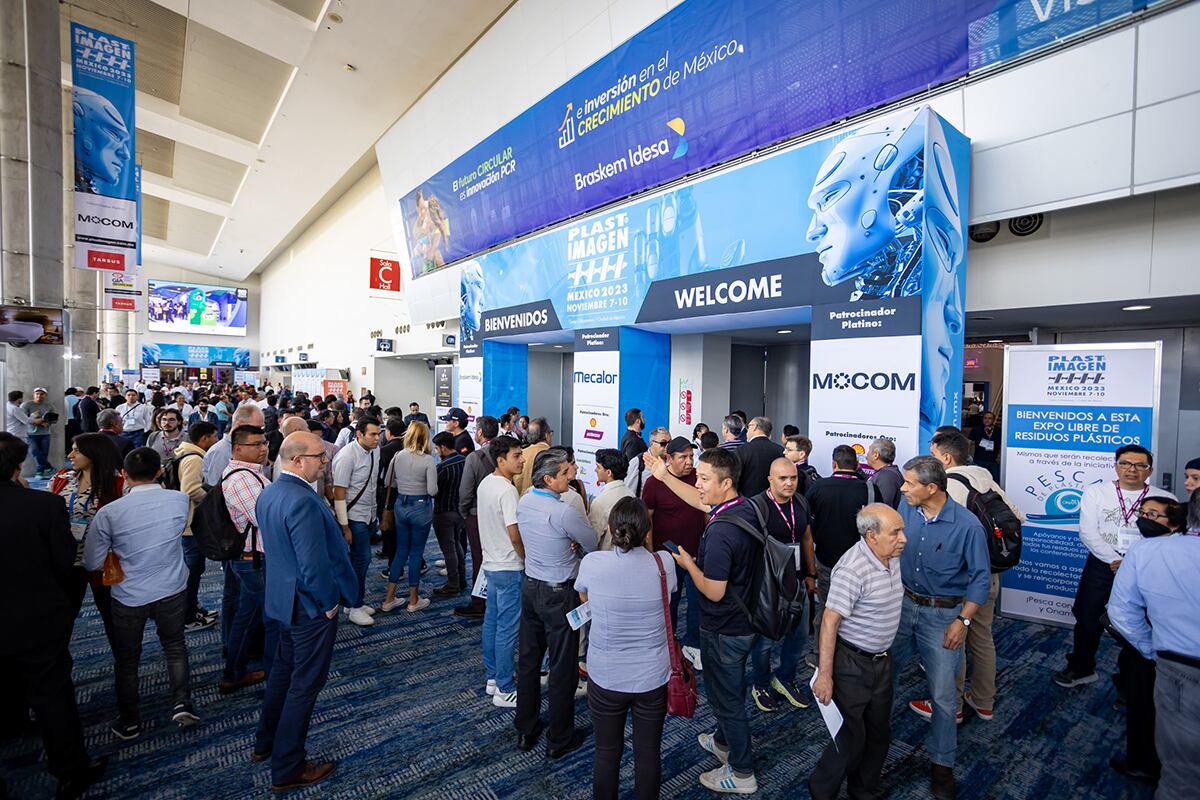Facing Tariff Instability: Insights from Plastimagen-Mexico

The plastics industry in Mexico is preparing for the different scenarios amidst the uncertainty arising from the tariffs situation.
Plastimagen, Latin America’s largest plastics trade show, occurred in Mexico City during the first half of March 2025. Many conversations at the event focused on market instability driven by U.S. tariffs affecting multiple categories of Mexican exports. Despite this, a consistent message emerged: Mexico is prepared to adapt and stay competitive under any potential global trade scenario. Although I expected to encounter fear or hesitation, I saw confidence and determination within the Mexican plastics sector.
You can also read: The Plastics Industry and Policy Changes Under Trump.
This industry, though heavily reliant on automotive exports to the U.S., has steadily grown and matured over the last two decades. As a result, manufacturers and suppliers proactively seek innovative ways to overcome future trade disruptions and economic challenges. Consequently, the tone at Plastimagen was not uncertainty but readiness to evolve and strengthen regional supply chains. Industry leaders expressed a unified belief that flexibility and resilience will define Mexico’s continued success in a shifting global marketplace. The investments, the infrastructure, and above all, the knowledge developed are not going anywhere. The internal market has also grown and developed, and the evolving demographics ensure a larger and more robust domestic consumption. So, whatever the scenario, Mexico is looking into the long game.
Voices of The Leaders
Several voices have emerged from both sides of the border advising about the potential harm the new tariffs may cause the plastics industry.
Matt Seaholm, President and CEO of the Plastics Industry Association (PLASTICS), issued the following statement in response to the Trump Administration’s implementation of reciprocal tariffs:
“In the spirit of supporting policies that encourage American manufacturing, our industry urges a thoughtful, strategic approach to trade and tariffs. The plastics industry is a cornerstone of U.S. manufacturing and a critical contributor to our economy. These new tariffs will disrupt supply chains, increase production costs, and undermine our global competitiveness”.
The leader expressed that “rather than imposing across-the-board tariffs that will harm American manufacturers and stifle growth, we encourage the administration to consider more targeted policies that take into account supply chains, promote investment, and maintain growth in U.S. manufacturing.”
Perc Pineda, chief economists of Plastics, has released a consistent a message through several conferences:
“For the Plastics Industry, the world is our market. We prosper with fair trade and commercial agreements well structured”.
In Mexico, Raul Mendoza, Director of Anipac, the National Association of the Plastics Industry, has stated that the potential imposition of U.S. tariffs on Mexico could have an impact of up to $2.255 billion on the plastics industry.
A Positive Light
Marlene Fragoso, who was President of Anipac until April 10th, 2025, commented during a press conference in Plastimagen that:
“We see ourselves in a very positive light, always thinking about growth, whatever the outlook, and we will be supporting any relationships and negotiations”.
Anipac foresees a 3% growth in the plastics industry, driven by the manufacturing of automotive parts, delocalization and operations and new projects to manufacture electric vehicles in Mexico. Currently, the plastic commerce under the trade agreement T-Mec represents well over USD 242 billions.
Pablo Vargas, owner of the company Privarsa and a recognized leader in the northern area of Monterrey, declares that every crisis brings also opportunities. Even though it may bring temporary pain, in a couple of months he expects “waters will calm and we will keep up somehow working”.
“It does worry us, uncertainty was never good for Business”, states Vargas. “Although the current scenario brings uncertainty, it also opens companies the opportunity to realize how can we improve our processes, how can we improve our costs and remain being competitive in the American market”.
From his point of view, “there are many areas of opportunity, many ways to improve through automation, through process optimization, through product replacement. There are many improvements and savings which can be achieved through technology”.
An Industry That Keeps Growing
Despite ongoing warning signs, Plastimagen conveyed that Mexico’s plastics industry remains resilient through past and future economic challenges.
Exhibitors across the show emphasized that, while uncertainty exists, the sector is prepared to adapt to new trade conditions.
They acknowledged current unrest but consistently projected optimism about finding practical solutions under any evolving market scenario or regulation shift.
Although investment decisions have been delayed, most stakeholders agree it’s only to assess implementation methods, not reconsider action entirely.
The real question concerns how investment will proceed—not if—as market demand and industrial confidence remain fundamentally strong and promising.
This continued growth is backed by favorable local conditions, reinforcing optimism about the plastics industry’s long-term momentum in Mexico.
The author acknowledges Tecnologia del Plastico as source for the interviews in this article.
